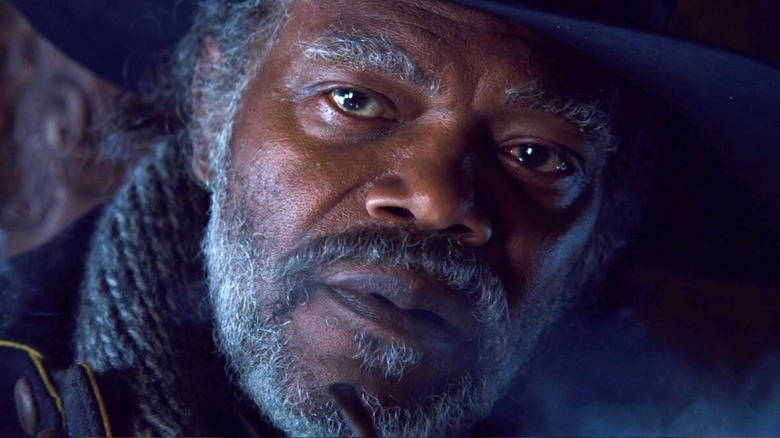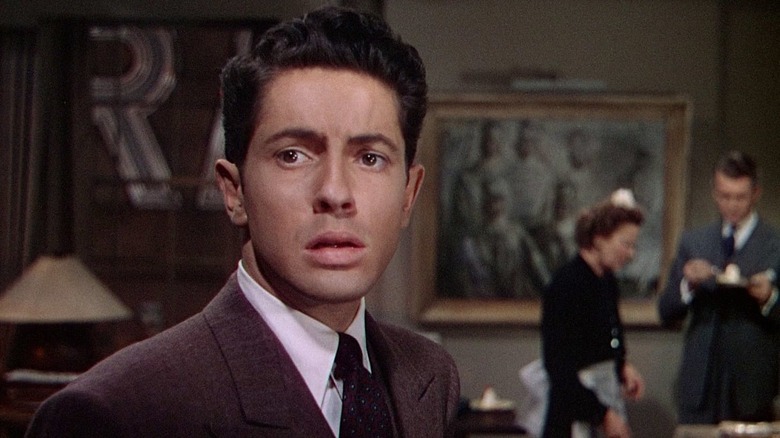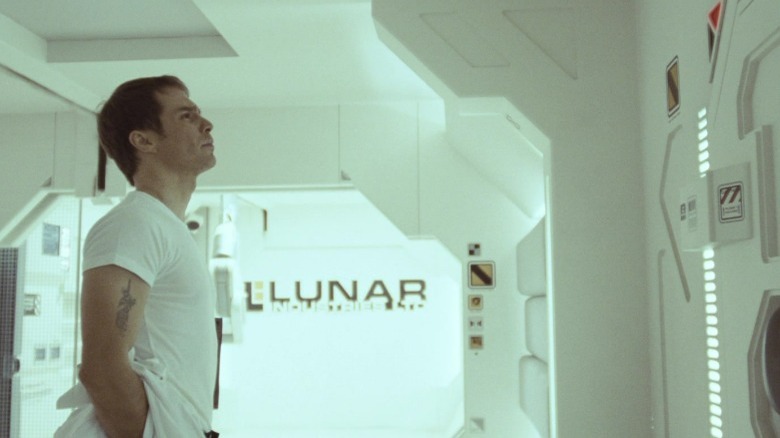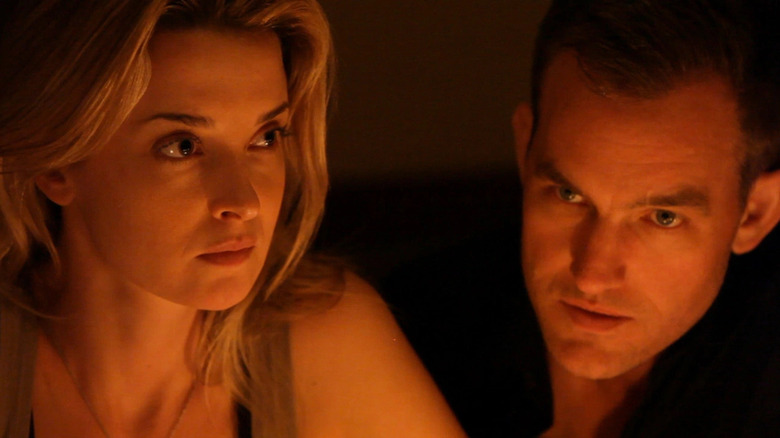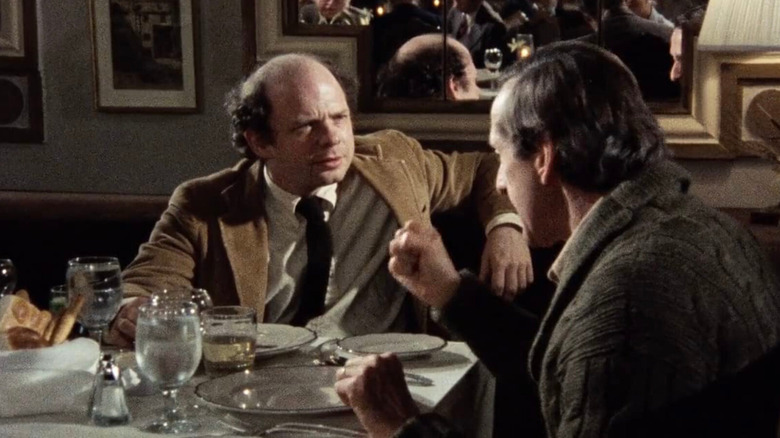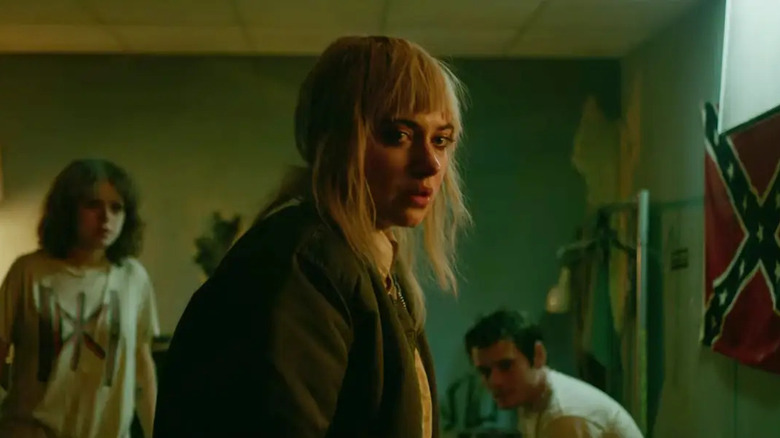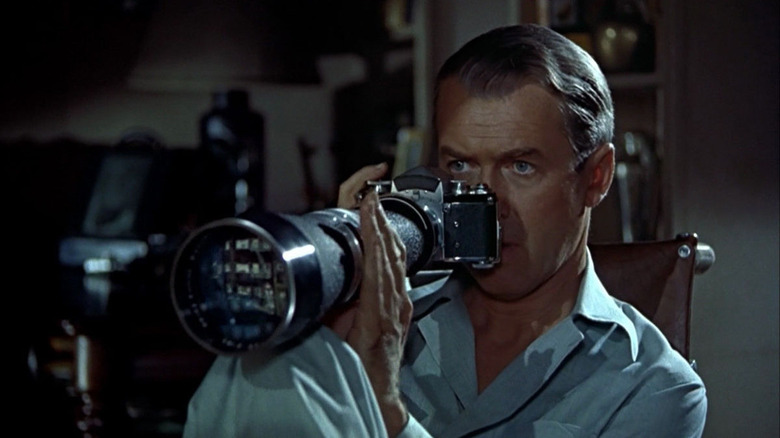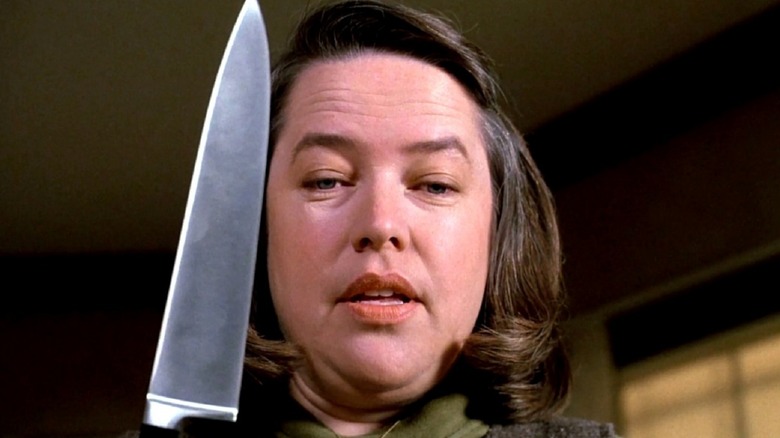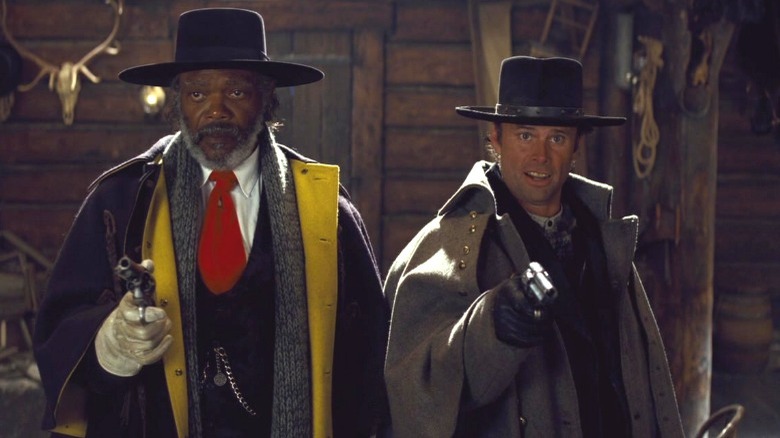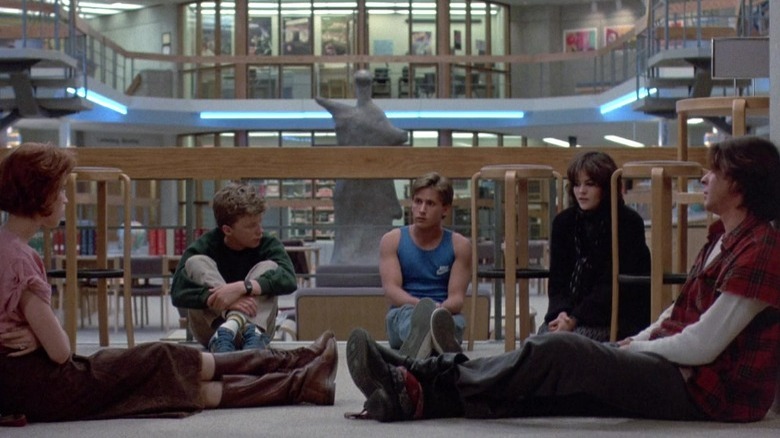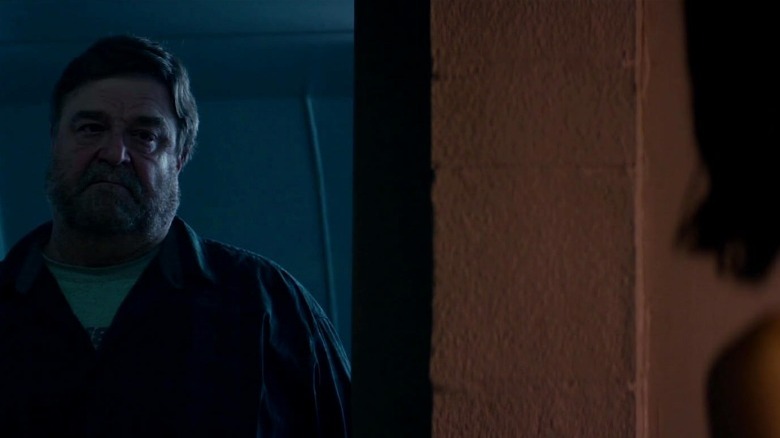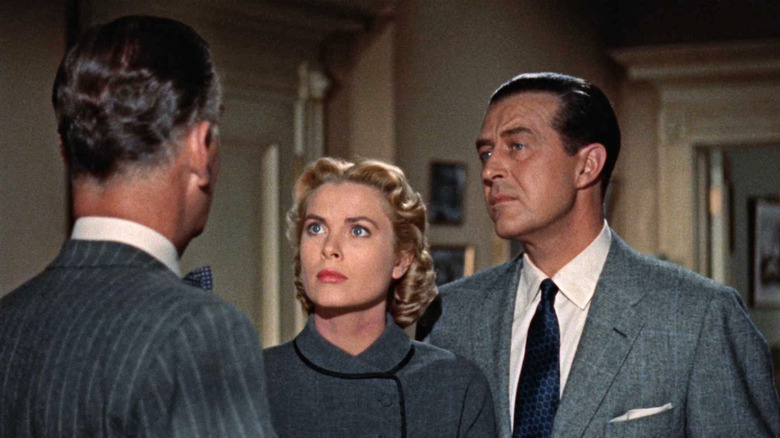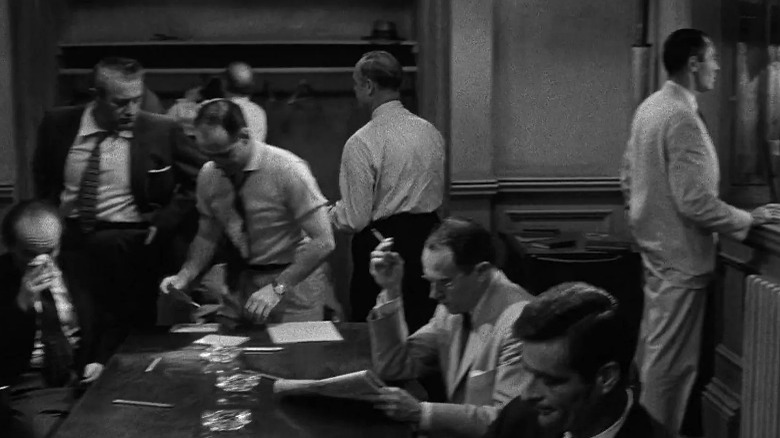The Best Movies Set In One Room
Audiences have been packing theaters for decades to see what wild and imaginative adventure awaits them in the next film release. With that in mind, it should come as no surprise to hear that some of the most successful franchises of all time have explored worlds and stories totally unlike what we experience in our own comparatively mundane lives.
Of course, some filmmakers have decided to buck that trend and do their own thing. Whether it's a result of budgetary restraints or a striking choice by a talented director, there are plenty of titles throughout the history of filmmaking that have opted to restrain their settings to a single room. When done correctly, this unorthodox decision can yield impressive results, as some of the best single-setting films rank among the all-time best movies in the world of cinema.
In no particular order, we'll be discussing some of the best films that are set (almost) entirely within one room. Just about every genre you can imagine, from comedy and horror to thrillers and sci-fi, will be making an appearance. The one thing that will stay the same throughout, however, is that each and every one of these picks takes full advantage of its choice of setting.
Rope
First up and the oldest on our list, "Rope" proves that in the hands of the right filmmaker, any setting can be used in service of an incredible feat of filmmaking. Except for an establishing shot, this twisted tale unfolds entirely within the confines of a single apartment, with "Rope" succeeding not despite that fact but because of it. The simple framework allows the plot room to breathe and gives the audience a laser focus on the interplay between its protagonists. Speaking of them, the film is also practically unprecedented for its less than subtle depiction of a homosexual couple during a time in which the Hays Code was in full effect, proving that legendary director Alfred Hitchcock wasn't afraid to defy just filmmaking conventions but societal and industry trends as well.
The grisly murder of David Kentley (Dick Hogan) at the hands of his two friends, Brandon Shaw (John Dall) and Phillip Morgan (Farley Granger), sets the tightly woven plot into motion. Nearly every murder has a motive, of course, although the justification that Brandon and Phillip have come up with is wholly unexpected. Instead of unpaid debts or a spur-of-the-moment crime of passion driving the pair to kill, the two men, believing themselves to be geniuses, simply want to see if they can get away with it. From there, the story gradually grows in tension, showing us which, if either of them, is truly up to their grim task.
Moon
Sci-fi is a genre loved by many for its expansive stories told across time and space where the only limit is our own imagination. Of course, even casual audiences are probably familiar with the genre's ability to bring to life far more muted storylines, with titles like "2001: A Space Odyssey" considered among the all-time great sci-fi films. Still, it feels like most contemporary entries have lost sight of the concept of "less is more" and opt to cram as much alien mayhem into their runtime as possible. A notable outlier is "Moon," with a mind-bending premise set entirely in a remote lunar station.
On the far side of the moon sits a tiny remote mining station. Constructed to harvest an alternative fuel for eventual transport back to Earth, its sole employee Sam Bell (Sam Rockwell) lives in total solitude. Almost at the end of his three-year stint at the installation, he begins to suffer from increasingly strange events that lead him to question the very nature of reality.
Though the mining station Sam is stationed at has multiple rooms, it's hard to argue against the fact that "Moon" is still one of the most isolating films in recent memory. After all, he's entirely alone on the dark side of Earth's nearest celestial body, right?
Coherence
Opening with a group of eight California friends enjoying a run-of-the-mill dinner party, nothing seems out of the ordinary apart from a clearly rocky relationship between two guests, Em (Emily Baldoni) and Kevin (Maury Sterling). As we soon discover, though, "Coherence" is far from a basic relationship drama. The party coincides with the passing of a noteworthy comet in the night sky, an event all the guests are lucky enough to witness when their home suddenly loses power. In fact, every house in sight save for one seems to have been affected by the blackout.
After a few of the partygoers make the seemingly innocent decision to ask the folks in the still-powered home for permission to use their phones, it's made clear that something is very, very wrong. What exactly is going on we won't say, but rest assured that "Coherence" is a film that's sure to make your head spin. Additionally, amongst multiple films we'll be discussing that often induce a feeling of being trapped, this might just be the most gut-wrenching of the pack.
My Dinner with Andre
There are films that make the daring decision to limit their story to one place or one room, and then there are films like "My Dinner with Andre" that take the concept to the next level. The film is, bluntly put, two hours of old friends conversing over dinner. A premise like that might already scare off all but the most patient fans, but any open-minded film buffs willing to try anything should read on.
Our predictably short list of characters includes the titular Andre (Andre Gregory) and his friend Wally (Wallace Shawn), who are former and current theater entertainers, respectively. The more worldly and well-traveled Andre spends much of the film regaling his beliefs and experiences to his friend, which we eventually find out to be at odds with Wally's perspective on the world. To Andre, life is meant to be enjoyed to the fullest, while Wally instead takes pleasure in the simpler things in life.
We're only grazing the surface of the deeper content of their conversation, but it's best to watch it yourself and experience the film fresh. Sure, it may have one of the least riveting premises ever put to screen, but underneath the dull exterior of "My Dinner with Andre" lies a hidden gem of filmmaking that's sure to surprise you with its craftsmanship.
Green Room
Possibly the most brutally violent pick on our list, "Green Room" definitely isn't an option for those with weak stomachs. Set in rural Oregon, a down-on-their-luck traveling punk band decides to perform an unplanned show at an out-of-the-way club. Unfortunately, they find it pretty hard to mesh with their crowd, given it's practically filled to the brim with members of a neo-Nazi gang. Things only get worse while they're trying to leave the venue, as they become the inconvenient witnesses to a gory murder at the gang's hands. Now held captive in the club's backstage green room, they're forced to try and escape before their captors decide to eliminate their hostages.
Tense, exciting, and absolutely packed with violence, "Green Room" is definitely one of the more extreme films of the last decade. Noteworthy for being one of the last films to star the late Anton Yelchin, his incredible performance isn't the only one worth mentioning here, with Patrick Stewart also starring as the head of the skinhead syndicate. Cap it all off with a thick layer of claustrophobia thanks to its uncomfortable setting, and you've got a must-watch for any film enthusiast.
Rear Window
Another classic film from Alfred Hitchcock, "Rear Window" is arguably one of the greatest titles in his absolutely incredible filmography. Filmed almost entirely within the apartment of a wheelchair-bound man named L. B. Jeffries (James Stewart), his condition leaves him with little to choose from in the way of entertainment. Turns out he's also just a bit of a creep since his idea of fun involves spying on his neighbors through a pair of binoculars and a camera. Over time he begins to form a sort of parasocial relationship with them, giving them all unique nicknames based on their appearance and mannerisms.
It's during one of these routine observations that Jeffries begins to notice some shady behavior from one of his neighbors, Lars Thorwald (Raymond Burr). First, he hears sounds of a struggle, then a mysterious object being carried away in the night by Thorwald. The final piece that falls into place is the sudden absence of Thorwald's wife the next day, leading Jeffries to suspect his neighbor of murder. The only problem is that he's the sole witness to the supposed crime, and there's not much he can do to prove his suspicions due to his injury.
Full of suspense and frequently wordless character development, "Rear Window" fully earns its reputation as one of Hitchcock's best movies.
Misery
It's tough to argue with the fact that Stephen King is the master of horror. The legendary author has built his reputation over the years through dozens upon dozens of novels and short stories. Many of King's stories have gone on to become beloved entries in the horror genre, with all-time classics like "The Shining," "It," and "The Mist" among them.
Though much of King's work relies on supernatural events to deliver scares, the 1990 film "Misery" breaks the trend by incorporating an unflinchingly real antagonist into its twisted story. Add in the claustrophobic setting and truly phenomenal performances resulting in an Oscar win for Kathy Bates, and you have the makings of a flick worthy of being among any horror buff's list of favorites.
Besides setting so many of his works in Maine, another of King's best-known tropes is to center his stories around writers, as is the case in "Misery." After being involved in a rough car wreck, famous romance author Paul Sheldon (James Caan) awakens in a rural cabin in the care of a woman named Annie Wilkes (Kathy Bates), who claims to be a big fan of his work. While things start innocently, Annie has a few problems with how Sheldon plans on ending his ongoing series that she makes clear. Given the condition he is left in after the accident, Sheldon has little room to negotiate with his caretaker turned captor as the nightmarish situation gradually declines within the confines of Annie's rustic cabin.
The Hateful Eight
Speaking of entries set within a cabin during the dead of winter, Quentin Tarantino's "The Hateful Eight" is a sprawling drama that takes the single room concept and runs with it. Spanning nearly three hours in length, you might think it would get dull after a while, but a standout cast and gripping dialogue make this film a nail-biter the whole way through. It may not be another horror movie like "Misery," but that definitely doesn't mean there's any shortage of blood — it's still a Tarantino film after all.
Set some time after the end of the Civil War, the hatred and division between former enemies is still alive. During a particularly brutal snowstorm, strangers from all corners of the country are forced to take refuge under one roof. There's bounty hunter John "The Hangman" Ruth (Kurt Russell), Union Army veteran Marquis Warren (Samuel L. Jackson), Confederate veteran turned Sheriff Chris Mannix (Walton Goggins), and plenty more. Together, the predominantly unsavory cast of characters combines to bring the tension to a boiling point almost immediately. While "The Hateful Eight" isn't usually ranked as one of Tarantino's best films, it might just be the director's most underrated gem.
The Breakfast Club
Leaving behind the genres of horror and bloody thrillers, "The Breakfast Club" is a much-needed dose of levity on this list. It's not all laughs, though, as there's also plenty of heart in this classic coming-of-age teen drama. Directed by the late John Hughes, who later wrote and directed other iconic flicks of the '80s like "Weird Science" and "Ferris Bueller's Day Off," this one fully explores the theme of being a misunderstood teenager that's present throughout Hughes' work.
"The Breakfast Club" introduces your typical band of high school students, each of whom has been forced to spend the day in Saturday detention. Coming from all walks of high school life, we meet the misfits, Brian (Anthony Michael Hall), Allison (Ally Sheedy), and Bender (Judd Nelson), alongside the popular kids, Andrew (Emilio Estevez) and Claire (Molly Ringwald). Together they represent all the archetypes you might expect to make an appearance in a movie about misunderstood high school students. Each member of this brat pack has their differences, though over the course of the film they learn that they might have more in common than they first thought.
With a premise far from the Chicago trotting adventures of Ferris Bueller and the sci-fi mayhem of "Weird Science," "The Breakfast Club" is definitely distinct from Hughes' later films. Thanks to his bold choice to set this one almost entirely in one room, we were given an intimate look into our protagonist's lives that isn't present in his other works.
10 Cloverfield Lane
It might not technically be one room, but we don't think it's stretching it too far to talk about a film set within the unnaturally lit confines of a bomb shelter. "10 Cloverfield Lane" takes place in a refuge deep underground that Michelle (Mary Elizabeth Winstead) wakes up in with little memory of how she got there. The only two things she knows for sure is that she's currently bound to a wall, and she's not alone down there. Her captor Howard (John Goodman), however, doesn't seem like a bad guy. He did save her life after finding her in a mangled car wreck — or so he says. He also claims that an army of aliens may have launched an all-out attack on planet Earth and that the air above ground is toxic, so who's to say how reliable this guy really is.
From there the plot descends into madness. There are clear signs that Howard's claims might just be the ramblings of a total loon, although a mountain of evidence suggests that he, Michelle, and a third fellow named Emmett (John Gallagher Jr.) are some of the last people alive on the planet. Either way, the only way for Michelle to know for sure is to risk it all by leaving the bunker behind and stepping into the unknown.
Dial M for Murder
The last entry from Alfred Hitchcock on our list, "Daily M for Murder" shows just how much the groundbreaking director could accomplish with limited settings. As the name suggests, this film deals with a favorite Hitchcock theme — murder. Instead of trying to get away with the crime like in "Rope" or trying to figure out if a murder even occurred as in "Rear Window," "Dial M for Murder" is instead all about being wrongly accused of a crime you didn't commit.
After discovering that his wife Margot (Grace Kelly) has been having an affair, Tony Wendice (Ray Milland) is understandably furious. He crosses the line, however, by plotting to have his unfaithful wife killed. That's not the only motive Tony has to commit the heinous crime, though, as he also stands to make a hefty profit should Margot die due to her immense fortune. Relying on a third party to separate himself from the violent act, the attempted murder winds up going horribly wrong, leading Tony to instead frame his wife for the death of his accomplice.
As you should expect by now, most of the action takes place within the Wendice's shared apartment. Its themes of false accusations and failures of the justice system make it one of Hitchcock's best and a perfect companion piece for our final pick.
12 Angry Men
Not just one of the best films to be set within one room, "12 Angry Men" is often remembered as one of the greatest films of all time. In fact, you'd be hard pressed to find a single critic or film buff who can earnestly call this one skippable.
Even if you've made it this far without ever hearing about this all-time classic, you're likely familiar with its premise. An 18-year-old man stands on trial accused of murdering his father. If found guilty, he's guaranteed to be put to death. The evidence, seemingly overwhelmingly in favor of his guilt, is enough to convince the entire jury to call for his conviction — except for one initially anonymous not guilty vote. Now at an impasse with the other 11 jurors, it's up to the sole skeptic (Henry Fonda) to try and reach a unanimous verdict with his peers.
Set (almost) entirely within the same jury room, "12 Angry Men" may be one of the most powerful commentaries on the importance of a fair and impartial justice system. Renowned film critic Roger Ebert said as much in his 2002 review, calling the film: "a crash course in those passages of the Constitution that promise defendants a fair trial and the presumption of innocence."
